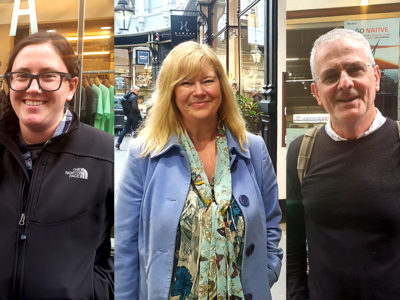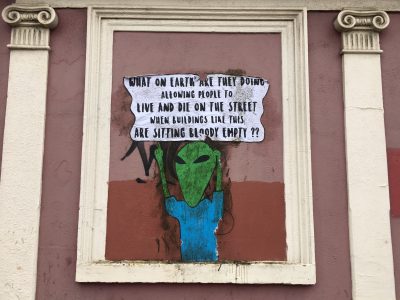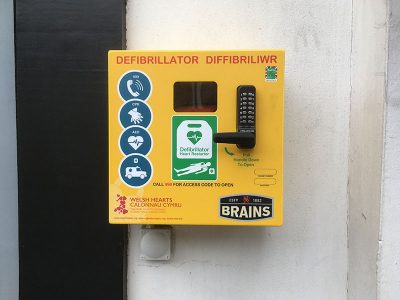Case study: Martyn Hutchings
How the opt-out proposals will affect potential recipients
Martyn Hutchings is also the Chairman of the Welsh Kidney Patients Association, an organisation comprised of patients and carers, which gives a voice to patients and offers them support.
Although he claims that, the haemodialysis he receives three times a week is not painful, he admits it is incredibly tiring and disruptive to his life. He says, “It impacts on every part of your life and takes it over, which is one reason I am looking forward to the transplant; I’ll get my life back and be able to lead a normal life again.”
He believes the opt-out organ donation proposals are a great idea and claims, “It’s not an answer in itself, but it is an additional key issue which will make a big difference to people like me.”
The moral issues surrounding the new Welsh organ donation proposals
As 55-year-old Martyn Hutchings pulls up his sleeve, he reveals a network of painful looking scars; the result of having haemodialysis, where he is attached to a blood cleaning machine, three days a week, for four and a half hours each day. Martyn cannot go on extended holidays because he needs to be close to a dialysis machine, nor can he go out in the evenings three out of seven nights a week because he is too tired after his dialysis sessions to do anything but sleep.
For Martyn, who has been waiting for a kidney transplant for four years, there is light at the end of the tunnel; he has received news he will be receiving a kidney next February. But Martyn is one of lucky ones. Research shows that one person dies each week while waiting for an organ transplant in Wales. However, recent proposals by the Welsh Government could dramatically change this heart-breaking statistic. On 8 November this year, the Welsh Government published a White Paper which could mean Wales will be the first nation in the UK to introduce an opt-out organ donation system.
Currently, people are not deemed to be organ donors unless they have specifically opted to donate their organs upon death. Generally, the new legislative proposals will mean that, from 2015, all Welsh residents will be presumed to be organ donors unless they have expressly opted out. However, the White Paper sets out several qualifying clauses; only people over the age of 18 who both live and die in Wales will be included, individuals must have lived in Wales for a sufficient length of time before being included and a potential donor’s family will be consulted to ensure their compliance with the donation.
Unnecessary deaths
Approximately 300 people in Wales are currently awaiting an organ transplant and while it is easy to think you will not be affected, statistics from the UK Transplant Organisation suggest you are more likely to need a transplant than be a donor.
Health Minister Lesley Griffiths fully supports the paper and says, “The shortage of organs and tissues continues to cause unnecessary deaths and suffering, both to patients waiting for a transplant and their relatives.” She continues, “When people die, donation of their organs and tissues is often possible but currently does not happen – not because they did not wish to donate but because they never got round to joining the organ donor register.”
One of the main assertions made in support of the paper is that numerous other countries in Europe have successfully introduced an opt-out system, most notably, Spain and Belgium. Kidney Wales Foundation claim that, since its introduction of presumed consent in 1986, Belgium’s donation rates have increased significantly with only a small number of people opting out.
Baroness Jenny Randerson, who was one of the first Assembly Members to suggest the opt-out proposals says, “I am strongly supportive of the proposals because they are based on experience from across the world of systems which are tried, tested and successful. Everyone of us would still be able to opt out of organ donation and families’ wishes would still be fully taken into account but the big change would be that organ donation would be something we are all asked to consider.”
A moral issue
Despite there being many supporters of the proposal, there are those who are critical of the system mainly because they believe the new system will be an infringement of human rights.
This view has, perhaps, been most famously argued by The Archbishop of Wales, Dr Barry Morgan. He claims, “There is, in presumed consent, a subtle or perhaps not so subtle change of emphasis in the relationship between the individual and the state. That is, that unless we have opted out, our organs belong to the state and the state has the right to do with them as it wills.”
He continues, “The implication by default, is that the state can decide on our behalf. I think that compromises individual rights and freedoms and poses the moral question as to whether the state can make such decisions.”
As Martyn pulls down his sleeve he discusses how, although he can appreciate both sides of the argument, the proposals will hopefully make a big difference for other people in his situation.
If you want to have your say on the proposals the Welsh Government’s public consultation is open until 31 January 2012 at http://wales.gov.uk/docs/dhss/consultation/111107orgdonwpen.pdf
Case study: Martyn Hutchings
How the opt-out proposals will affect potential recipients
Martyn Hutchings is also the Chairman of the Welsh Kidney Patients Association, an organisation comprised of patients and carers, which gives a voice to patients and offers them support.
Although he claims that, the haemodialysis he receives three times a week is not painful, he admits it is incredibly tiring and disruptive to his life. He says, “It impacts on every part of your life and takes it over, which is one reason I am looking forward to the transplant; I’ll get my life back and be able to lead a normal life again.”
He believes the opt-out organ donation proposals are a great idea and claims, “It’s not an answer in itself, but it is an additional key issue which will make a big difference to people like me.”





